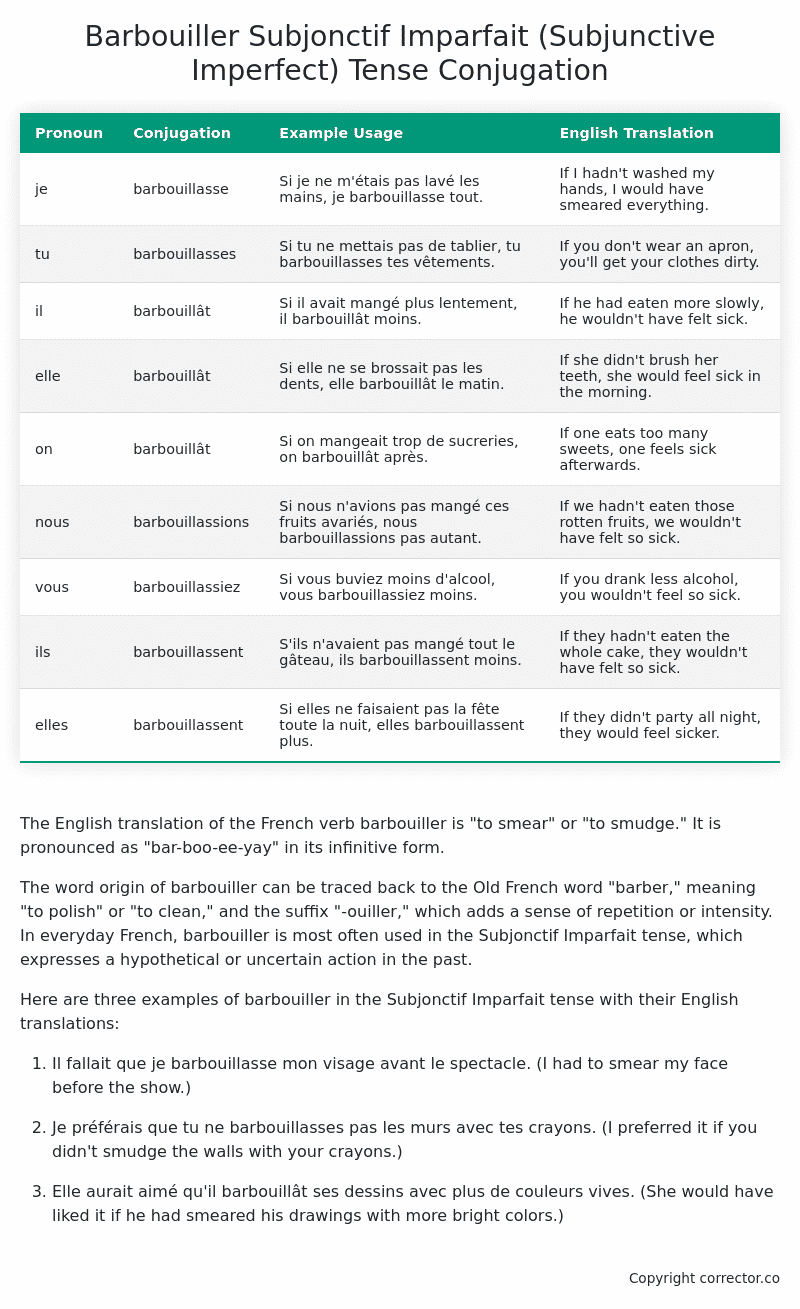Subjonctif Imparfait (Subjunctive Imperfect) Tense Conjugation of the French Verb barbouiller
Introduction to the verb barbouiller
The English translation of the French verb barbouiller is “to smear” or “to smudge.” It is pronounced as “bar-boo-ee-yay” in its infinitive form.
The word origin of barbouiller can be traced back to the Old French word “barber,” meaning “to polish” or “to clean,” and the suffix “-ouiller,” which adds a sense of repetition or intensity. In everyday French, barbouiller is most often used in the Subjonctif Imparfait tense, which expresses a hypothetical or uncertain action in the past.
Here are three examples of barbouiller in the Subjonctif Imparfait tense with their English translations:
-
Il fallait que je barbouillasse mon visage avant le spectacle. (I had to smear my face before the show.)
-
Je préférais que tu ne barbouillasses pas les murs avec tes crayons. (I preferred it if you didn’t smudge the walls with your crayons.)
-
Elle aurait aimé qu’il barbouillât ses dessins avec plus de couleurs vives. (She would have liked it if he had smeared his drawings with more bright colors.)
Table of the Subjonctif Imparfait (Subjunctive Imperfect) Tense Conjugation of barbouiller
| Pronoun | Conjugation | Example Usage | English Translation |
|---|---|---|---|
| je | barbouillasse | Si je ne m’étais pas lavé les mains, je barbouillasse tout. | If I hadn’t washed my hands, I would have smeared everything. |
| tu | barbouillasses | Si tu ne mettais pas de tablier, tu barbouillasses tes vêtements. | If you don’t wear an apron, you’ll get your clothes dirty. |
| il | barbouillât | Si il avait mangé plus lentement, il barbouillât moins. | If he had eaten more slowly, he wouldn’t have felt sick. |
| elle | barbouillât | Si elle ne se brossait pas les dents, elle barbouillât le matin. | If she didn’t brush her teeth, she would feel sick in the morning. |
| on | barbouillât | Si on mangeait trop de sucreries, on barbouillât après. | If one eats too many sweets, one feels sick afterwards. |
| nous | barbouillassions | Si nous n’avions pas mangé ces fruits avariés, nous barbouillassions pas autant. | If we hadn’t eaten those rotten fruits, we wouldn’t have felt so sick. |
| vous | barbouillassiez | Si vous buviez moins d’alcool, vous barbouillassiez moins. | If you drank less alcohol, you wouldn’t feel so sick. |
| ils | barbouillassent | S’ils n’avaient pas mangé tout le gâteau, ils barbouillassent moins. | If they hadn’t eaten the whole cake, they wouldn’t have felt so sick. |
| elles | barbouillassent | Si elles ne faisaient pas la fête toute la nuit, elles barbouillassent plus. | If they didn’t party all night, they would feel sicker. |
Other Conjugations for Barbouiller.
Le Present (Present Tense) Conjugation of the French Verb barbouiller
Imparfait (Imperfect) Tense Conjugation of the French Verb barbouiller
Passé Simple (Simple Past) Tense Conjugation of the French Verb barbouiller
Passé Composé (Present Perfect) Tense Conjugation of the French Verb barbouiller
Futur Simple (Simple Future) Tense Conjugation of the French Verb barbouiller
Futur Proche (Near Future) Tense Conjugation of the French Verb barbouiller
Plus-que-parfait (Pluperfect) Tense Conjugation of the French Verb barbouiller
Passé Antérieur (Past Anterior) Tense Conjugation of the French Verb barbouiller
Futur Antérieur (Future Anterior) Tense Conjugation of the French Verb barbouiller
Subjonctif Présent (Subjunctive Present) Tense Conjugation of the French Verb barbouiller
Subjonctif Passé (Subjunctive Past) Tense Conjugation of the French Verb barbouiller
Subjonctif Imparfait (Subjunctive Imperfect) Tense Conjugation of the French Verb barbouiller (this article)
Conditionnel Présent (Conditional Present) Tense Conjugation of the French Verb barbouiller
Conditionnel Passé (Conditional Past) Tense Conjugation of the French Verb barbouiller
L’impératif Présent (Imperative Present) Tense Conjugation of the French Verb barbouiller
L’infinitif Présent (Infinitive Present) Tense Conjugation of the French Verb barbouiller
Struggling with French verbs or the language in general? Why not use our free French Grammar Checker – no registration required!
Get a FREE Download Study Sheet of this Conjugation 🔥
Simply right click the image below, click “save image” and get your free reference for the barbouiller Subjonctif Imparfait tense conjugation!

Barbouiller – About the French Subjonctif Imparfait (Subjunctive Imperfect) Tense
Formation
Common Everyday Usage Patterns
Interactions with Other Tenses
Subjonctif Présent
Indicatif Passé Composé
Conditional
Conditional Perfect
Summary
I hope you enjoyed this article on the verb barbouiller. Still in a learning mood? Check out another TOTALLY random French verb conjugation!


